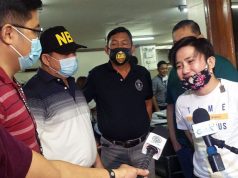
The scenario that Senate President Vicente “Tito” Sotto raised on usage of suicide vests on his Twitter account as an attempt to justify the proposed anti-terrorism bill can be addressed by the country’s existing laws.
The third highest ranking official in the government has been defending the highly controversial Anti-Terrorist Act of 2020 through the microblogging platform ever since it was proposed in the legislature.
His latest tweet cited a scenario of an individual wearing a suicide vest.
“When you see a person wearing a suicide vest, will you wait for a warrant?” Sotto wrote.
His tweet gained 198 retweets and more than 1,300 likes as of writing.
Under the proposed measure, people who engage in “acts intended to cause death or serious bodily injury to any person, or endangers a person’s life” can be called a terrorist.
An individual who also “engages in acts intended to cause extensive damage or destruction to a government or public facility, public place, or private property” is also tagged a terrorist.
Those who possesses or uses “weapons, explosives or of biological, nuclear, radiological or chemical weapons” also fall under the definition.
Closer look at current laws
While Sotto asked a rhetorical question about use of suicide vests as a means to justify the anti-terror bill, there are already existing laws that deal with that sample scenario.
Under Republic Act 9516 or the Illegal Possession of Ammunition and Explosives Act, it is prohibited to have any possession of “any explosive or incendiary device” that is “capable of producing destructive effect on contiguous objects or causing injury or death to any person.”
Republic Act 9372 or the Human Security Act of 2007, the law that the Congress recently attempted to amend, also penalizes individuals who are considered “accessories,” an “accomplice” or an instigator of certain acts punishable under provisions of the Revised Penal Code (RPC).
These acts include “crimes involving destruction” under Article 324 of RPC in which an individual is penalized for causing destruction “by means of explosion” in public systems like railways or vessels and if the act “has endangered the safety of any person.”
A warrantless arrest can also be done under the Revised Rules on Criminal Procedure. Section 5 of Article 111 states that a “peace officer or a private person may, without a warrant, arrest a person” for the following:
- When, in his presence, the person to be arrested has committed, is actually committing, or is attempting to commit an offense;
- When an offense has just been committed, and he has probable cause to believe based on personal knowledge of facts or circumstances that the person to be arrested has committed it and;
- When the person to be arrested is a prisoner who has escaped from a penal establishment or place where he is serving final judgement or is temporarily confined while his case is pending, or has escaped while being transferred from one confinement to another.
A number of lawyers on local Twitter also pointed out that the lawmaker’s offered scenario does not need the proposed anti-terror bill to be sanctioned.
No. Because it’s legal to arrest someone in flagrante delicto without a warrant TO BEGIN WITH po. 🤦🏻♂️
You don’t need the anti-terror bill. It’s already covered under the revised penal code, the human security act, or RA 9516 (unlawful possession of explosives).Sorry to be epal. https://t.co/2Hd1o3g1sG
— Mickey Ingles (@MickeyInglesLaw) June 4, 2020
The Revised Penal Code can take care of that. https://t.co/ksDgupFp87
— K (@Legally_K) June 4, 2020
Some students also pointed out the existing laws that deal with such a scenario.
“Senate president pero di alam ang batas, NAKAKAHIYA!” a Twitter user exclaimed.
Senate president pero di alam ang batas, NAKAKAHIYA!
Section 5, Rule 113 of the Revised Rules on Criminal Procedure allows warrantless arrests:
(a) When, in his presence, the person to be arrested has committed, is actually committing, or is attempting to commit an offense; https://t.co/bogA2ppAyT
— Calvin Almazan #OustDuterteNow (@CalvsAlmazan) June 4, 2020
so what’s the point of your argument, mr. senate president? it’s plain nonsense but let me answer your dumb question.
warrantless arrest can be done and we already have existing law to cover such situation. read rule 113, section 5 of the rules of court. https://t.co/hsYA9nYO1Z pic.twitter.com/vlDQRoAfVD
— 앗그스⁷ ☁️ (@ownedbyjungkook) June 5, 2020
Sotto previously slammed the critics of the proposed anti-terror bill and called them “epal,” claiming that the measure has supposedly enough safeguards to ensure that state forces would not go after government critics.
Various rights groups and even local celebrities have expressed their alarm over certain provisions that were seen to potentially stifle dissent and curtail constitutionally-protected civil liberties.









